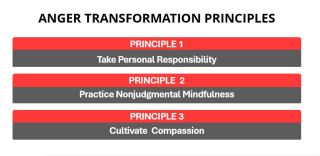Anger
How to Create Value from Anger
The power of responsibility, nonjudgment, and compassion.
Posted February 13, 2024 Reviewed by Hara Estroff Marano
Key points
- Used wisely, anger can create peace and harmony in your life.
- To transform anger, you must first take personal responsibility.
- Nonjudgmental mindfulness is the antidote to anger.
- Deep anger transformation requires compassion.

While anger can be destructive, if used wisely, anger can be of great value. Anger alerts us to problems and pushes us to correct a situation. It indicates that something in our relationships, in our lives, or within ourselves lacks harmony and wholeness.
Anger is activated when our values are not in agreement with the situation we experience. Accordingly, anger makes us aware of our beliefs and what we stand for. It also motivates us to take action to change the situation—to align the reality we face with our values. On a large scale, anger inspires us to establish social justice and greater well-being. It can be a critical force toward our psychological well-being and spiritual growth.
But how do you transform anger to become a positive force in your life and create value from it?
Transforming anger requires change from the inside out. You need concrete, practical tools—ones that work in real-life situations. Here I outline the three foundational principles for working skillfully with anger: taking personal responsibility, practicing nonjudgmental mindfulness, and exercising compassion.
Taking Personal Responsibility
What others say and do may be the stimulus for our anger, but it is never the cause. Our feelings are the result of how we choose to interpret a situation, how we choose to receive what others say or do, and our needs and expectations in that moment.
To transform anger, you must first take personal responsibility. You must be willing to acknowledge your feelings. You must recognize that without training, your mind can be your worst enemy. You must have the courage and discipline to look critically at your thoughts, including your expectations and the ways you may be blaming others. You must commit to claiming your power and being accountable for your actions. This is the first principle in working skillfully with anger.
Personal responsibility requires you to take ownership of your anger. It involves looking more objectively at what has triggered your anger. You must let go of blaming others for your problems and holding unrealistic expectations about what others “should” do or how the world “should” be and instead take full responsibility for your beliefs and actions. This is the path to true anger liberation.
Practicing Nonjudgmental Mindfulness
Anger presents us with tough challenges. It limits our perspective to a narrow, emotionally tinted bandwidth that obscures nuance, context, and complexity, making it extremely difficult to see the big picture or take another person’s perspective. Anger often traps us in a quicksand of thoughts about how someone has treated us disrespectfully or about how we’re certain we’ll be treated unfairly in the future.
Nonjudgmental mindfulness is the antidote to such a challenge. Practicing nonjudgmental mindfulness is the second principle in transforming anger. This opens and expands your bandwidth, allowing you to take in more information and broaden your perspective. It brings you back to what is true here and now. It allows you to pause long enough to choose your response rather than react impulsively. Once you know how to bring nonjudgmental awareness to your own thoughts and emotions, you’ll be equipped to transform anger into a force that brings about positive change and creates value for all.
The strong sensations of anger and the thoughts that go with it can pull you away from the present moment. Yet nonjudgmental mindfulness brings you back to the present and helps you see yourself and your life clearly, just as you are. It enables you to hear the wisdom beneath your anger and empowers you to live as the wisest and most courageous version of yourself.
Exercising Compassion
Deep anger transformation requires compassion. When you see what we all are up against—when you see the suffering and struggle that all humans face—the only response that makes sense is simple compassion. Compassion is the key to opening yourself up to life and to others. Developing compassion invites you to abandon the struggle of the ego, which allows you to move toward the highest version of yourself.
Cultivating compassion involves engaging both your attitude and your actions. A compassionate heart allows you to accept others as they are, while self-compassion allows you to tolerate all of your feelings, even the difficult ones such as anger, fear, jealousy, and resentment.
When you are angry, remind yourself that others usually are doing their best—however mediocre it may seem—given their own ability, skills, situation, and limitations. When you avoid judging others who have done something “wrong” and instead try to understand why they did what they did in the first place, you develop compassion toward that person. When you adopt this attitude, you move from criticism to forgiveness, from separation to unity, and from anger to grace.
Summary
Compassion is the awareness of suffering—another person’s or your own—coupled with the desire to ease that distress. Mindfulness is a deep, nonjudgmental focus on the present moment. With nonjudgmental awareness and compassion, we can allow anger to reveal itself in its all manifestations, and we can meet it without judgment. By quieting the mind, we gain the space to explore our thoughts, feelings, and sensations, and these in turn reveal the message beneath our anger. Compassion dissolves our resistance and gives us room to accept ourselves and other people.
Together, personal responsibility, nonjudgmental mindfulness, and compassion are powerful principles for breaking our negative habits around anger and resolving the needs that gave rise to anger. These principles allow you to manage anger and create value from it. They serve as the gateway to clarity, equanimity, and happiness.




